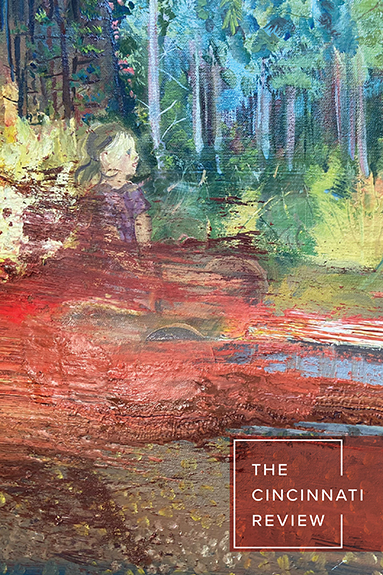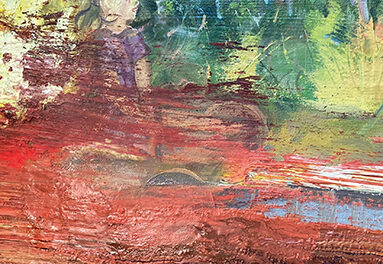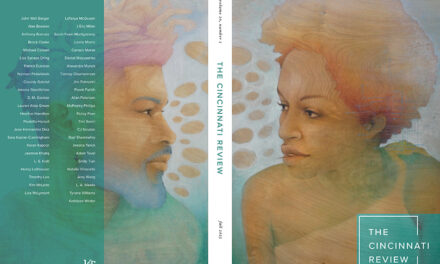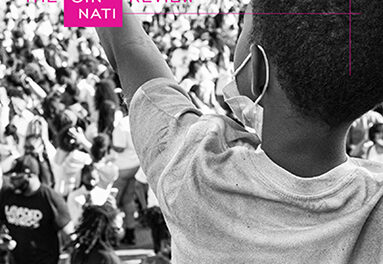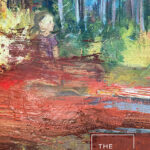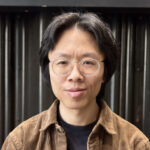A binary star system consists of two stars that rotate around a shared center of mass, appearing to orbit each other. To the naked eye, they are indistinguishable, existing as a single point of light in the night sky. Only through a high-powered telescope can the stars be differentiated as they sear the space around them.
* * *
I never told you this, but I always felt like you were the older sibling. You were more outgoing than I; you drank and smoked and partied first, while I was scared of what could happen if I did. All I ever knew how to do was follow the rules. In reality, you are my younger brother, by three years.
In high school we were mistaken for twins by gas-station attendants and checkout clerks. Our heights were identical, and our faces bore the same flaws. Although we shared physical similarities, our personalities were diametrically opposed. You once visited my third-grade classroom when Mom was volunteering. The teacher divided the class into small groups to practice speed rounds of multiplication, addition, and subtraction for prizes: full-size candy bars. I tensed; math had never been my thing. You joined my group, sitting cross-legged on the scratchy carpet next to kids three years your senior, and answered all the questions first, shocking everyone but Mom and me. Our group earned 3 Musketeers and Milky Ways; classmates gushed over your precocity while I sat there glowing like a groupie in your light.
* * *
Binary stars are classified according to their orbits. Close binaries consist of two stars whose gravitational fields are near enough to exchange mass. Constrained by the laws of physics, most of the larger star’s volume gets transferred to the smaller star, known as the vampiric star because it appears to siphon gases from the primary star. The stars evolve in tandem, as the behavior of each depends on the characteristics of the other.
* * *
For the year we overlapped in high school—my senior year and your freshman—we ran track and cross-country. Our high-school campus rests on a grassy plateau, meaning that each run began downhill and ended uphill. There weren’t many sidewalks or bike lanes, so we ran shoulder to shoulder on the roadside, shifting into single file when cars passed. Our shoes pounded out metronomic rhythms on the fat white lines and dusty gravel shoulders. During the final mile, we’d accelerate as we crested the last hill, inhaling and exhaling air like life as we eyed the finish beyond the soccer fields and baseball diamonds: the chain-link fence marking the entrance to the football stadium and the brick-red track. We didn’t admit we were racing, but we both knew we were vying for the lead, leaving the rest of the team behind and flying over the pavement until our fingers grasped the cool metal of the fence.
We truly raced just a few times. On an early spring afternoon, a warm wind sighing in from the west, the usual knot in my chest doubled in size waiting for the start because I was standing next to you. I danced through my prerace ritual, pounding fists on thighs, jumping three times, pulling knees to chest. You shook your legs out once and bent low. The starter in his red-and-yellow pullover raised a pistol to the cloudless sky. “On your marks, set,” and then the tiny puff of smoke, the shattered golden shell falling to earth as we embarked on this familiar trajectory.
You beat me only once, using suspicious tactics—cutting me off and then slowing down, speeding up and moving into lane two whenever I tried to leave you behind. Past the finish line, you said, “I couldn’t let my sister beat me,” and gestured to the crowd gathered in the bleachers as if to append your statement with “in front of all these people we know.” Neither of us realized then that high school didn’t count for much. I rolled my eyes, accepted your apology. Our relationship was like that—one of forgiveness, mutually understood motives. You always wanted to prove yourself, and I did my best to let you.
One memory stands out, though, the last time I felt the immense power and freedom that running can give us—late spring, another afternoon track meet. We were lined up for the two-mile race: eight laps around the track. We waited for the starter to speak. He raised his gun, but we never saw smoke. The PA announcer explained that lightning had been sighted in the area, that the rest of the meet was canceled.
Adrenaline still coursing through our veins, you and I sprinted through the chain-link gate and away from the track. We ran five miles through a biblically heavy rain that soaked our shirts and weighted our shoes. We ran because the warm rain slid over our faces and limbs like cosmic fingertips covered in silk. We ran because it made us feel alive, because the chances of getting struck by lightning are 500,000-to-1 and we didn’t have to get lucky to be spared.
* * *
Once the vampiric star gathers enough mass, it becomes a red giant or supergiant—a rapidly expanding star. Inside, nuclear fusion increases in speed and intensity. If star is large enough to be classified as a supergiant, its life ends when a nuclear chain reaction causes its core to detonate. This explosion is called a supernova, a massive star’s brilliant death, emitting enough light to blind galaxies.
* * *
Once, before you entered high school and joined the team, a group of cross-country guys and I on a run stopped to search for an opening in traffic at a busy intersection opposite a Speedway and a used-car dealership. We rarely waited for the lights to change, growing impatient as our heart rates dipped out of the aerobic zone. A boy in my grade stepped into the road and directly into the path of an oncoming car. I was sure he was going to die right there in front of us, mowed down by a car going fifty miles per hour. Then, one of the older guys grabbed the back of his T-shirt and yanked his body back onto the curb as the car rushed by.
That boy’s recklessness is what I saw in you after I started college and our lives began to bifurcate. You became harder and harder to reach as you rushed headlong into danger, narrowly evading many deaths. You barely graduated—there were no college acceptances, no celebration. You were diagnosed with type 1 bipolar disorder and later with schizoaffective disorder. The latter appears in only 0.3–0.8 percent of our country’s population; you are an anomaly.
When you were manic, you’d stop taking your mood stabilizers because you felt even more invincible than the average teenager. You’d raise your voice when our parents and I didn’t want to listen to your conspiracy theories and religious doctrines—whatever ideologies you could latch onto that would make sense of the world. You’d steal our parents’ credit cards and run away to parties and drug dens, going MIA for weeks at a time. Mania would always end in near tragedy. You once crashed your car in the middle of the road that led to our parents’ house. For weeks, every time I crossed the intersection, I saw a portion of the shattered silver bumper shining like a sickle in the moonlight.
Bouts of severe depression would follow mania. You’d lie face down in bed for days, catatonic. Our parents and I had to check that you were still alive, putting a hand on your back to see if it rose and fell. I wondered under which circumstance your death would occur. Would it be brilliant, earsplitting—a fatality on the magnitude of your mania—or quiet, forgettable, a fading away.
* * *
In a close binary, if one star transfers enough of its mass, that donor star becomes a white dwarf, its core condensing, nuclear fusion slowing. The star cools, emitting progressively less light until it is nearly invisible. If the mass of this star’s remnant falls below a critical threshold, it will cease to emit light, becoming a black dwarf, a type of dark matter: an extinguished body that can be located only by tracing its influence on surrounding objects. The effect of gravity—the mutual attraction between any two bodies in space—is never invisible. The speed of stars near the edges of spiral galaxies, like our own Milky Way, rotate faster than the laws of physics dictate they should. The only way this could be possible is through the gravitational pull of dark matter—ostensible voids—at their centers.
* * *
I tried to mother you once, amid the dimming of your light. We were twenty-two and nineteen. Our parents had kicked you out for stealing their credit cards again. On a snowy January night I gathered my college roommates in the kitchen, sink overflowing with dirty dishes, refrigerator nearly bursting with expired food. I told them you needed a place to stay and asked if you could sleep on the futon in the upstairs hallway.
My relationship with my roommates was purely transactional—I did not know them well. We split rent and utilities, but I was the only one who ever cleaned the shared spaces. I could never use the kitchen because I refused to wash their dishes to make room for mine. I held mild resentment toward these four women who had been my teammates before injuries ended my competitive running career. That night, barely meeting my gaze, they said yes to my question that wasn’t really a question.
Your probation officer came to survey the premises, and gave his approval, with conditions. I’d have to drive you to his office downtown twice a week so you could piss for a drug test. I had to sit across a desk from him in the same building that housed the district court and answer questions about your character. He looked ex-military, with a buzz cut and significant biceps. He asked me several questions, but I remember one clearly because it was at the root of everything: Do you think your brother is fundamentally a good person who wants to change for the better? He phrased the question as if the answer could be simply yes or no. I said Yes, meaning, He deserves this chance.
The upstairs hallway of the shared house was drafty, so I gave you my heated blanket, tried to make you feel at home. I bought us groceries, which I stored in the old brown mini fridge our parents had used in the ’80s. I suggested you use the college gym, right across the street, because they never checked ID and working out was good for your mental health. What I didn’t tell you was that I needed you just as much as you needed me.
After I’d lost my athletic scholarship, my grades had started slipping. I started dating a woman for the first time—my manager at Wendy’s, a job I’d needed to recoup some of the scholarship money I’d lost. I was realizing that the distance between the person I actually was and the person I believed myself to be was as vast as several galaxies. You were my North Star, the only person mooring me to a self I could recognize. My primary purpose now would be caring for you, for however long this lasted.
Our parents liked the idea of you living with me because there was a bus stop right outside my house, so theoretically you could ride the bus to work once you found a job. You had just been fired from the position Dad had gotten you because you’d used a company van to scrap stolen steel beams for cash.
At the end of the second week I drove you to a local temp agency, but you wouldn’t go inside. I just can’t, you said as we sat in my car. My heater had broken for the second time that winter. Our breath shape-shifted between us. I’m not like the rest of those people in there, you said. I wish I had asked you how it felt, right then, to have a mind like yours. As if I could ever understand.
Instead, I just told you, It’s okay, drove us away and parked in the lot of the nearest shopping mall. I ran through snowdrifts and a biting wind from storefront to storefront, gathering applications. I already knew you wouldn’t complete them, but I thought you might appreciate the gesture.
Regardless of whether you found a job or not, I was happy having you live with me. We would talk late into the night, you spinning side to side in my desk chair while I sat cross-legged on my twin bed. You evangelized about the Illuminati, and I listened, because I thought maybe my listening could heal you. I told you about work and what I was writing. We listened to each other as if the nights were endless and we’d never see the sun again.
I divulged something that bound us even more inextricably than before. I told you I was dating a woman, then held my breath. Because you were the first family member I’d told, I would live or die by your reaction. I’m so happy for you, you said, and we embraced in the dim yellow glow of a bulb bearing too little wattage. I still dream of it: how strong and solid and close you were.
* * *
The shifting of stars is constant. Astrological events that appear instantly were set in motion millennia ago. The average lifespan of a star is hundreds of millions of years, but to casual observers, a star is either a sequin in the night sky or it is gone, was never even there. Hydrogen and helium—matter in its most volatile form, the elements that burn—compose over 90 percent of a star’s volume.
* * *
Shortly after you moved into the hallway, Kendra, my manager-turned-girlfriend, moved into my bedroom. You two got on like old friends, a necessity for living in such proximity. With both of you, I had everything I could want within these squalid conditions that confined us. Amid my happiness, I never forgot that addiction’s trigger is as thin as a thread.
Your girlfriend called one night, her voice thin and shaking. She told me you’d broken her car window, that you were bleeding badly and might need to be taken to the hospital. Fearing for her safety, she’d barricaded herself in her apartment and left you in the car.
Kendra and I drove through an icy rain to your girlfriend’s off-campus apartment, where we found you in the passenger seat of her used gold Lincoln. Crushed glass littered the asphalt like rock candy, wet and glistening; your face glowed electric blue from the screen of your phone. In that artificial light you looked young and old simultaneously, as if age were a fluid, pulsing, living thing. You were disturbingly composed, your voice monotone as we assessed your injuries. You’d broken the window with your elbow, and pieces of glass were embedded along your arm, the red parts viscous. The bleeding had mostly ceased, but your DNA dotted the upholstery like paint flicked from a brush.
We talked and laughed nervously as we drove you away, not wanting to acknowledge the gravity of the night’s events. Back at home, Kendra cleaned and dressed your wounds with hydrogen peroxide, Neosporin, and bandages we’d picked up at Walgreens, butterflying the worst parts. You thanked us, and that night I slept easy knowing I’d traversed space and time to snatch you from the brink.
. . .
For more of this essay or other great literary nonfiction in Issue 21.2, order now in our online store. Digital copies are only $5.
Carly Parker-Plank (she/her) is a writer living in Ravenna, Michigan. Her essays have been published in Under the Gum Tree, Contrary Magazine, and Crab Orchard Review. She holds an MFA in creative writing and pedagogy from Miami University in Oxford, Ohio. She is currently working on a novel.

